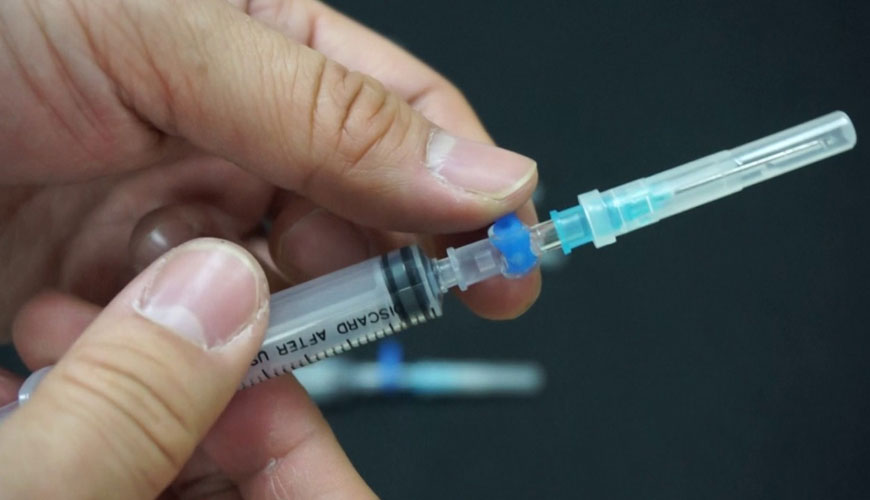

EUROLAB laboratory provides testing and compliance services within the scope of ISO 7886-1 standard. Developed by the International Organization for Standardization (ISO), this part of the ISO 7886 standard specifies requirements and test methods for validating the design of empty sterile disposable hypodermic syringes, with or without needles, made of plastic or other materials and intended for the aspiration and injection of fluids after they have finally been filled.

Syringes for use with insulin, disposable syringes made of glass, syringes for use with power-driven syringe pumps, syringes prefilled by the manufacturer, and syringes intended to be stored after filling (e.g., a kit for refilling by the pharmacist).
The needleless hypodermic syringes specified in this document are intended for use with the hypodermic needles specified in ISO 7864.
The ISO 7886 series primarily covers subcutaneous syringes for human use and provides performance and testing requirements. Allows for wider variation in design so as not to limit innovation and packaging methods. Its appearance and layout is consistent with other relevant standards, designed to be more performance-based compared to the prescriptive design.
General requirements as design guidelines for manufacturers are introduced in this document. Various limits for requirements have been maintained, which are based on the past but have been validated in practice for many years.
Materials to be used for the construction and lubrication of disposable sterile syringes are not specified as the selection will depend to some extent on the design, manufacturing process and sterilization method used by the individual manufacturers. Syringe materials must be compatible with injection fluids. If this is not the case, the unit should be labeled on the packaging to draw the user's attention to the exception. It is impractical to specify a universally acceptable test method for incompatibility because the only definitive test is that a particular injection fluid is compatible with a particular syringe.
Pharmaceutical manufacturers use solvents in injectable preparations. Such solvents should be tested by the manufacturer of the injectable preparation for any possible incompatibility with materials commonly used in syringe construction. If a mismatch is detected, the injection fluid should be properly labeled. The impossibility of testing any injection fluid with all available syringes is recognized and it is strongly recommended that regulatory authorities and relevant trade associations recognize the problem and take appropriate action to assist manufacturers of injectable preparations.
Syringes must be manufactured and sterilized in accordance with recognized national or international good manufacturing practices for medical devices.
The sampling plans for review selected for the ISO 7886 series aim to validate the design with a high level of confidence. Sampling plans for inspection do not replace the more general production quality systems requirements that appear in standards in quality systems, such as the ISO 9000 series and ISO 13485.
Manufacturers are expected to take a risk-based approach and use usability engineering during the design, development and manufacture of syringes.
This document does not provide the requirements for the batch version. The syringes are primarily for human use. The sterile syringes specified in this document are intended for use immediately after refilling and are not intended to contain medication for extended periods of time.
Among the services provided by our organization within the framework of material testing services, there are also ISO 7886-1 standard tests. Do not hesitate to contact our laboratory EUROLAB for your testing and certification requests.
To get an appointment, to get more detailed information or to request an evaluation, you can ask us to fill in our form and reach you.